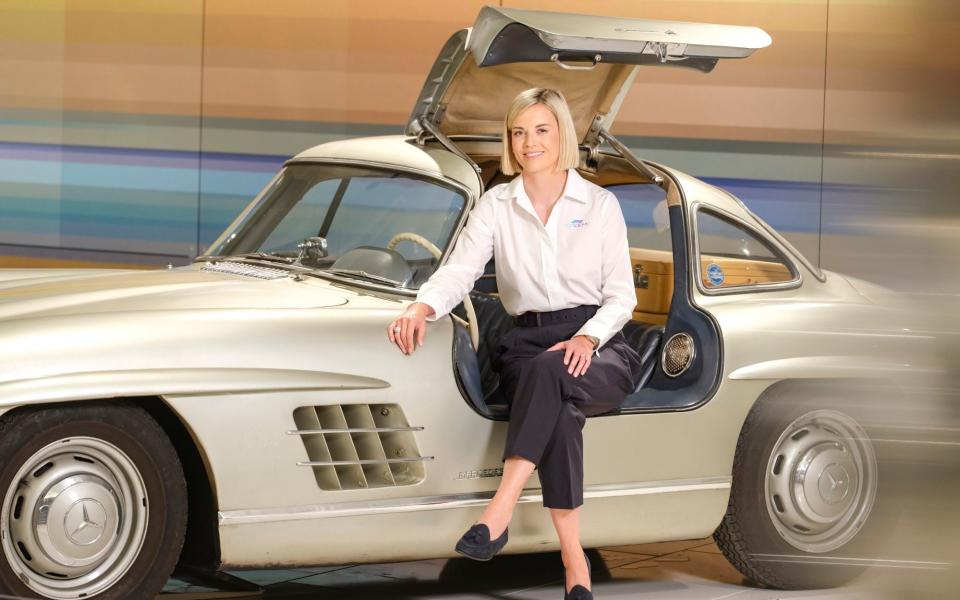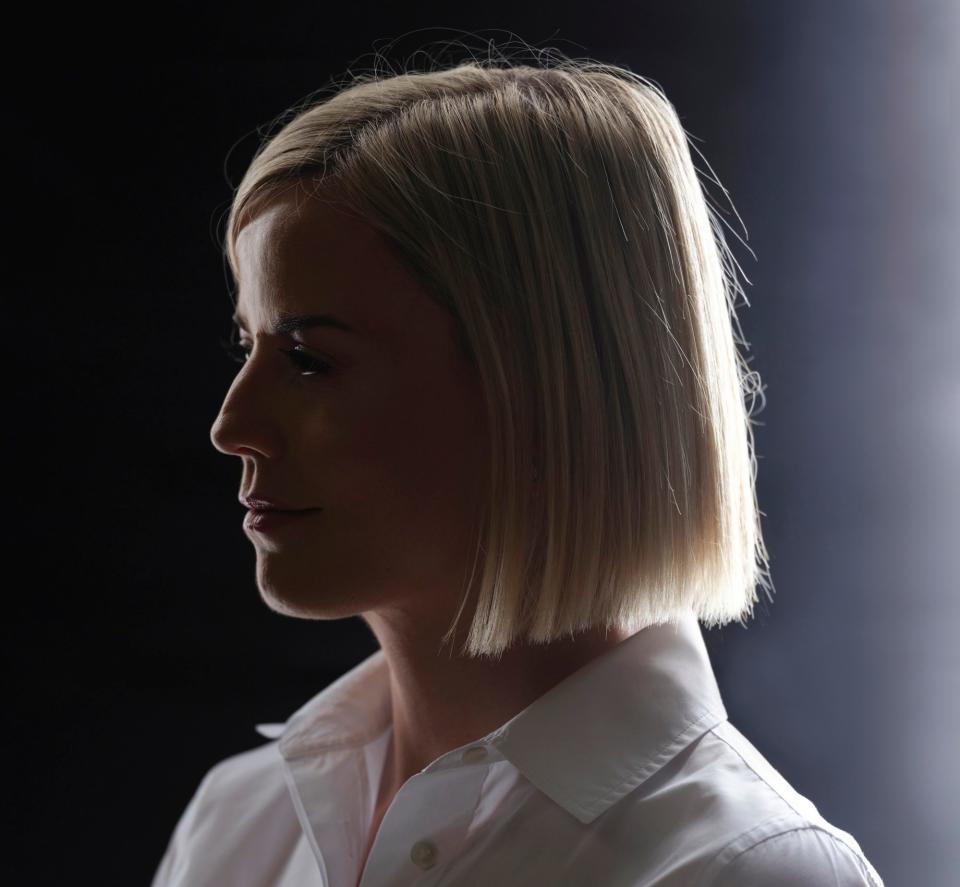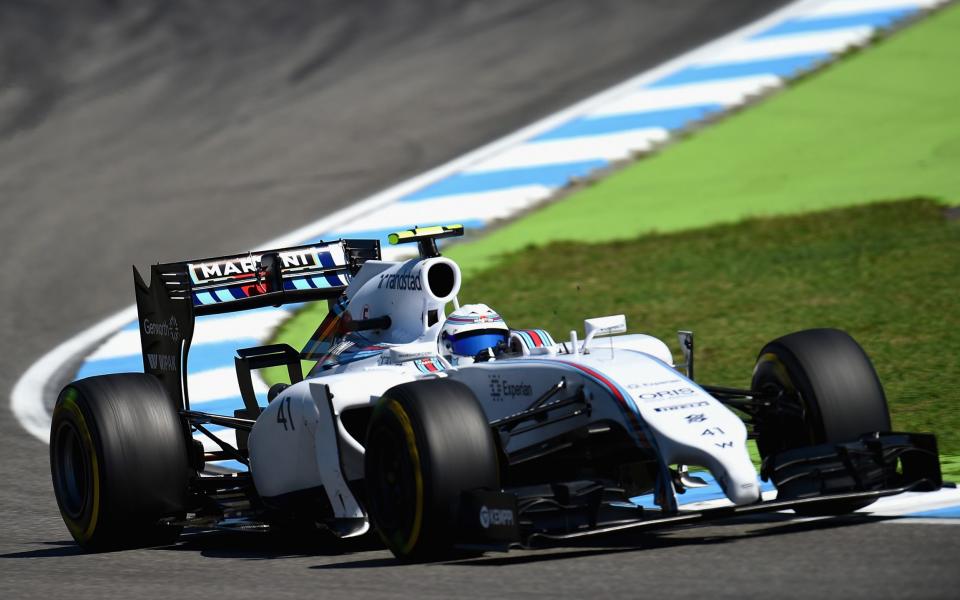Former test driver Susie Wolff: ‘There’s still a stigma to being beaten by a girl’

This weekend, all the major movers and shakers in Formula 1 have descended on Silverstone for the British Grand Prix. On track, seven-time world champion Lewis Hamilton will attempt to slow Max Verstappen’s seemingly inexorable charge towards a third successive title. Off it, their respective team principals, Mercedes’ Toto Wolff and his nemesis, Red Bull’s Christian Horner, will also do battle: sniping in the press, competing for talent, positioning their teams for this season and beyond.
But arguably the most significant power move made in motorsport this week may already have taken place. Its architect was none other than Susie Wolff, wife of Toto. And just quietly, she is hoping she may have triggered a revolution.
Wolff, née Stoddart, is a Scottish ex-racer well known in motorsport not for being Toto’s other half, but for the fact that she was once a test driver for the Williams team. The 40-year-old only drove in a handful of test and practice sessions, but in doing so came as close as any female has in almost 50 years to actually competing in the sport. Not since Lella Lombardi raced in Austria in 1976 has a woman actually started an F1 grand prix. And only Lombardi and fellow Italian Maria Teresa de Filippis have raced in motorsport’s top category since the championship began in 1950.
Wolff is hoping to change that. As managing director of F1 Academy, a new all-female single-seater series, she is currently thrashing out what she believes could be a ‘game-changing deal’ with F1’s 10 teams, which she hopes will boost female participation in motorsport like nothing before.
Leaning back in a chair in the library of the uber-exclusive Monaco Yacht Club, sunshine glinting off the luxury boats bobbing about in the harbour behind us, Wolff lets out a snigger. ‘It’s true,’ she nods. ‘He really did once describe me as a donkey!’ We are talking about her husband, Toto Wolff, one of F1’s biggest personalities and star of Netflix’s hit docu-series Formula 1: Drive to Survive.

The donkey reference actually cropped up in an interview the couple gave to Ben and Georgie Ainslie’s Performance People podcast last year. Discussing their contrasting personality types, Susie revealed that Vienna-born Toto had once likened himself to an Arab racehorse – ‘a very high performer’, but skittish – whereas she was more of a donkey. ‘I didn’t say you were a donkey!’ he protested. ‘There are these workhorses in Austria called Haflinger. They are on the mountains… They have these furry legs. They go and go…’
In the YouTube version of the podcast, you can see Susie, by this point in hysterics, miming someone digging a hole ever-deeper. The exchange is a window into their relationship: playful, loving, with Susie giving as good as she gets. But it also says something about both of their characters. Toto is a high performer, there is no doubt about that. Forbes named the Austrian, who owns one-third of the Mercedes F1 team, a billionaire in its most recent Rich List. And Susie? Well, ‘donkey’ may be a bit harsh for a woman who once gave Hamilton a run for his money in karting. But she knows what her husband meant. ‘Don’t underestimate the donkey,’ she says, grinning. ‘It gets there in the end. I do have a lot of tenacity.’ She is going to need it in her latest role.
There have been various attempts down the years to drive female participation in motorsport and achieve the ultimate breakthrough: returning a woman to the F1 grid. Wolff believes F1 Academy is different. For starters, it is the first all-female series launched and owned by Formula 1 itself. That means it is in F1’s interests for it to succeed. So whereas W Series, for instance, the previous (and much-hyped) all-female series that lasted three seasons before going bankrupt this year, was given an enviable platform by the sport – granted one of F1’s coveted ‘support series’ slots at grands prix around the globe – the fate of F1 Academy is far more intertwined with the brand.
Not only will it compete on the F1 circuit from next season, but the two series will collaborate far more closely. Wolff cannot speak just yet about what that might look like, as the finer details are still being ironed out. Suffice to say there are some very exciting plans in the offing that she hopes to announce soon. ‘I think there are some forward-thinking team principals in Formula 1,’ she says. ‘I certainly feel a real commitment from within the paddock to help change things now.
‘When I met them all after my announcement [at the season opener] in Bahrain, I said to all of them, “Please don’t think of this as a ‘woman’s thing’ being run by a woman. This is for the greater good of this sport. I hope it will add value to Formula 1 long-term. And we need to be on this journey together.” So far, the response has been very positive, I have to say.’
Wolff smiles. ‘But F1 Academy cannot just be about 15 young women racing. And we cannot have the sole purpose of trying to find the next female F1 driver. We have to stand for something much more. It’s about creating opportunity. How are we making motorsport accessible to girls? That’s why I’m spending a lot of my time in the world of karting right now, trying to understand, OK, who’s out there racing? At what level? What is stopping girls from racing? I think that’s where we’ve got to be really proactive. Because that talent pool is what we need to grow.’
Wolff is uniquely well-placed to do so. Born in Oban, in the West Highlands, she had a typically outdoorsy upbringing. Both she and older brother David, 18 months her senior, were put on skis and bikes as toddlers. Her parents, John and Sally Stoddart, owned a motorcycle dealership and her father raced bikes competitively, so racing was ‘in the blood’. But, Wolff says, she was ‘never a typical tomboy’. ‘I had my Barbie. I had my dolls. I liked that stuff. But I also loved going fast. I remember going to watch my dad race in Knockhill. They had this little go-kart track and my brother and I would be pestering him the whole weekend. It was £5 for 10 minutes and we’d be like: “Can we go again? Can we go again?”’

Eventually the family got a second-hand kart and that was it, although Wolff insists it was just ‘for fun’ until she was taken to a Formula 3 race at Donington Park one year and watched Jenson Button win. ‘That’s when I was like: “This is what I want.” After that I started racing in the European and world championships.’
It was at that point, too, that Wolff began to experience sexism for the first time. She had always been ‘the only girl’ in karting races. Or at least one of very few. But as her participation became more serious, so too did the feeling of being not just different but unwanted. ‘Funnily enough, half of my battle was with the parents of my competitors,’ she recalls. ‘For them, it was not wanting their sons to get beaten by a girl.’
Sometimes her own teams, supposedly on her side, were just as culpable. When she reached DTM, the German touring car championship, Wolff was famously made to drive a pink car. ‘I hated it,’ she says. ‘It was such a cliché. No one wanted to be overtaken by that car.’
Wolff recalls one particularly awkward episode when three-time F1 world champion Niki Lauda came to watch his son Mathias. ‘Mathias and I were teammates and it was a real thrill that Niki was coming to watch,’ she says, wincing. ‘So anyway, he walks into the garage, and all the drivers were in there, and without even saying hi to Mathias or anything, he took one look at me and said to Mathias: “Whatever you do, beat her.” Even Mathias was embarrassed.
‘Years later, when we obviously became friends at Mercedes [Lauda was the team’s non-executive chairman], I brought it up and Niki was like, “Yeah, I know. But I knew it wouldn’t have been helpful to Mathias if he got beaten by you.” I said, “But Niki, I was an impressionable young driver.” Obviously he was of a certain generation. But I think that still exists. That stigma. Not wanting to be beaten by a girl. The preconception that women are bad drivers. We have to change that.’

 Yahoo Autos
Yahoo Autos 